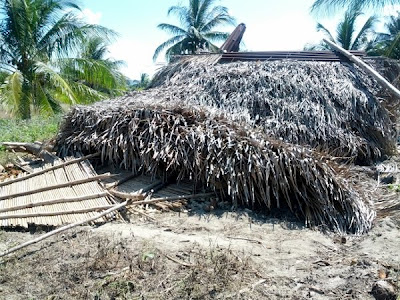
Most of what is found in the news regarding Honduras tends to converge on a single resounding theme—the deepening corruption of the state. Officials resign over scandals of embezzlement, police officers moonlight as armed robbers, entire state arsenals are found empty, supposedly the work of drug cartels. Carolina, one of many strong and energetic matriarchs who helps run—along with many other women and men—the June 10th Women’s Movement Farming Cooperative, has a different theory about the stolen arsenals. When a delegation I was a part of visited the farm last week, she told us:
The government only wants the United States to buy them more weapons, while they hoard the others. All those weapons are a direct threat against farmers. The government knows where they are hidden, and they will try to use them against us.
Communities like Carolina’s have good reason to suspect cynical motives. A week earlier, in the early morning of February 8, armed private guards of the Standard Fruit Company (Dole) invaded the campesino farming co-op of Salado Lis Lis and forced close to 500 families off the land. They had only enough time to grab their children and a few belongings before a Caterpillar bulldozer ripped through about 600 meager houses and tore wide, barren stripes through their crops.
On February 12, several brave families returned to Lis Lis to pick up the pieces of their lives in order to rebuild. When I arrived there on February 16, I saw that the bulldozer did not leave them with very much. Implosions of sticks, twine, and tin panels sat baking in twisted piles. “We also lost many animals,” said Luisa, who stood with her 4-year-old daughter in front of the littered patch of ground that used to be their home. “Chickens, dogs, cats, pigs—most of them were killed.” The loss of livestock and food crops is sure to worsen the problem of hunger in the community, where many are afraid of running out of food.
The history of Salado Lis Lis goes back at least to 1992, when a 100-year lease granted to Standard Fruit should have expired. Instead, the company remained illegally, then abandoned the land after much of their operation was destroyed by Hurricane Mitch in 1998. Shortly thereafter, the families who now live there had come to clear the destruction of Mitch and to cultivate rice, corn, yuca, beans, coconuts and plantains.
An agrarian reform that was passed by the National Congress in 2008 started the process of granting title to the families who were using and improving the land for citizens’ benefit, but the military coup in 2009 and the repeal of the reform in 2010 made it easier for a foreign fruit company with a questionable title to evict small-scale farmers. Indeed, the case of Lis Lis is only one of about 50 evictions that armed agents have carried out within the last year and a half. As Luisa explained, “Honduras does not live in peace. It’s a country full of risks for us, the poor ones.”
Those risks hang like a cloud over Lis Lis—even though the campesinos are back on the land, they know that the guards could return at any time. If we don’t take back our community, if we don’t put all our efforts into keeping it, the government will never simply give it to us,” said Pablo Alberto, another associate of the co-op. In order to sustain this presence, the families have begun to rebuild and replant. The bulldozer left them with nothing more to eat than coconuts, so they have been hunting wild game until other crops can be harvested. Children are the first to be fed, then the women, then the men. They have pooled their resources in order to buy vegetables and milk from the town about 2 miles away. The campesinos showed us two intact buildings which used to be their school, and which they are now using for mothers and small children to sleep in, away from the threat of crocodiles.
The fact that the families are doing what it takes to remain living on their land, and reaching out to tell their story to outsiders, is all they can do right now to deter another violent eviction. They are showing the power of their resilience to the well-connected company that wants them off the land. As Pablo explained, “we feel fear, but also we feel the pride and the warmth of defending our community.”
You can call Dole Fruit Company toll-free at 800-356-3111 to object to the way it is treating small-scale farmers in Honduras.
The names of all people quoted in this article have been changed in concern for their safety.

Thanks for bringing this to the attention of the world. We hear in Honduras need to have the world know of the efforts made to bring change and the repression that often ensues.
Gracias.
Thank you for this article. I have posted it to Facebook and will call Dole Fruit and boycott their products.